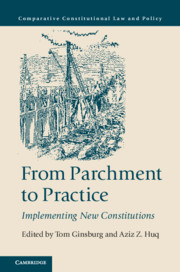Book contents
- From Parchment to Practice
- Comparative Constitutional Law and Policy
- From Parchment to Practice
- Copyright page
- Contents
- Figures
- Tables
- Contributors
- 1 Introduction
- Part I The Problem of Transformation in Constitutional Design
- Part II The Issue of Gender
- 6 The Long Road Ahead
- 7 Constitutional Reform and Women’s Political Participation
- Part III Institutional Development and the Role of Courts
- Part IV Authoritarian Transitions
- Index
7 - Constitutional Reform and Women’s Political Participation
Electoral Gender Quotas in Post-Arab Spring Egypt, Tunisia, and Jordan
from Part II - The Issue of Gender
Published online by Cambridge University Press: 28 February 2020
- From Parchment to Practice
- Comparative Constitutional Law and Policy
- From Parchment to Practice
- Copyright page
- Contents
- Figures
- Tables
- Contributors
- 1 Introduction
- Part I The Problem of Transformation in Constitutional Design
- Part II The Issue of Gender
- 6 The Long Road Ahead
- 7 Constitutional Reform and Women’s Political Participation
- Part III Institutional Development and the Role of Courts
- Part IV Authoritarian Transitions
- Index
Summary
This chapter examines the role of electoral quotes in expanding women’s political representation in three Arab Spring countries: Egypt, Jordan, and Tunisia. Drawing on Mona Lisa Krook’s tripartite framework for assessing quota efficacy – focused on how the quota fits within systems, practices, and norms – it suggests general insights that can be drawn from these stories. A key variable, the chapter suggests, is the extent to which the political institution in which the women are participating is itself dysfunctional.
Keywords
- Type
- Chapter
- Information
- From Parchment to PracticeImplementing New Constitutions, pp. 159 - 186Publisher: Cambridge University PressPrint publication year: 2020

